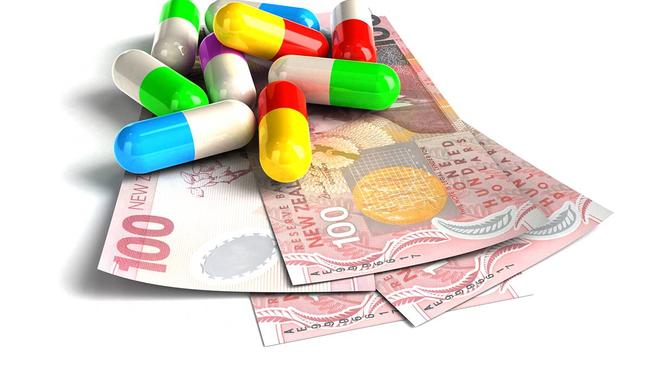Biocurious: Forgotten trans-Tasman ‘small Big Pharma’ takes on the big boys with a niche strategy
Trans-Tasman drug developer AFT Pharmaceuticals is targeting lucrative niche diseases its Big Pharma rivals have ignored.

AFT Pharmaceuticals has zeroed in on multiple diseases the big pharma plays don’t bother with – but can be highly profitable
AFT has targeted boosting its revenue from NZ$200 million to NZ$300 million within the next two years
Some AFT investors are tetchy about substandard returns, but co-founder Hartley Atkinson insists the company is focused on long-term growth
When Dr Hartley Atkinson and his nurse wife Marree founded AFT Pharmaceuticals (ASX:AFP) in their Auckland garage with NZ$50,000 ($45,000) in 1997, their many detractors said big pharma would shut down the enterprise within months.
“Everyone said I was an idiot because the big guys would squash us, but we are still here almost three decades on,” Atkinson says.
Hartley describes AFT as a “small Big Pharma” that does its own drug development and clinical trials.
Now valued at $260 million in the Aussie lingua franca, the trans-Tasman has refined the art of zeroing in on areas of medical needs which the big players have ignored.
“There are quite big holes because Big Pharma will focus on the really big markets – and there’s nothing wrong with that,” he says.
“But there are $750 million to $1 billion markets where patients really need treatments. The pharma market is big enough for everyone.”
Hartley is familiar with the whiles of Big Pharma, having been medical director at the Swiss based Roche.
“I learned all about clinical trials from the Swiss, who are pretty clever with these things.”
AFT last week reported record revenue of NZ$206 million and is confident of hitting its ‘aspirational’ target of $NZ300 million within two years.
Taking on Big Pharma
AFT sells more than 100 products in 80 countries, with distribution or licensing agreements taking the reach to 100.
AFT's offerings cover categories including pain, eyecare, dermatology, gut disorders, medicated vitamins and hospital injectables.
AFT's ‘hero’ products are the ibuprofen-paracetamol combination Maxigesic and Hylo, the country’s biggest-selling lubricating eye drop.
“People would assume Hylo is owned by the ophthalmology behemoth Alkine, but it’s us,” he says.
“We also have the number one over-the-counter combination painkiller and it’s not own by Sanofi or Reckitt Benckiser.”
About 70% of AFT's products (and revenue) are from over-the-counter products, with hospital and prescription drugs accounting for the rest.
“When an over-the-counter patent runs out, sales will continue,” Atkinson says.
“But in the case of a successful drug, a legion of generic competitors will quickly emerge.”
AFT is a ‘virtual’ company in that it outsources all drug manufacturing.
“We don’t own a factory or a warehouse, we are capital light,” Atkinson says. “Instead, we spend all our money on drug development and sales and marketing.”
In the pipeline
AFT spends about $NZ12-15 million annually on research and development – about 12% of revenue – and currently has about 13 R&D projects on the go.
Of these, five are largely completed and eight are underway.
AFT's “agnostic” program covers dermatology indications including keloid scars, strawberry birthmarks and port wine stains.
In partnership with Belgium’s Hyloris Pharmaceuticals, the company is developing a novel injectable iron therapy that targets a US$3.2 billion global market.
Iron deficiency affects about 15% of the world’s population - and is a sector taregted by ASX biotech big daddy CSL (ASX:CSL) since its contentious 2022, $18 billion purchase of Vifor Pharmaceuticals.
AFT has carried out multiple projects with Hyloris, which involve AFT having carriage of the preclinical and clinical work.
These programs include remedies for burning mouth syndrome (a post-menopause condition) and the chronic skin condition vulvar lichen sclerosus.
Both of these diseases have no treatments.
Keeping it in house
AFT also runs its own studies and eschews contracted research bodies because they are too expensive.
The company does many of its trials in Eastern Europe.
“We run them very cost effectively,” Atkinson says.
“The US Food & Drug Administration audited us for two weeks solid and no question asked.”
When formulating trials, AFT works closely with doctors close to the action.
“Inclusion criteria is important; they might tell you won’t get any patients for the study it will take forever.”
AFT is not fazed by large-scale studies.
For instance, its iron deficiency program is being supported by a phase III trial, enrolling about 1000 patients in the US, Europe, India and China.
China: seductive but dangerous
As the world’s second-biggest drug market, China holds an allure – and danger – that make Homer’s Sirens look like rank amateur seductresses.
“We believe you can’t ignore China, whereas a lot of just go to the US,” Atkinson says.
Of the 19 Chinese deals by western parties in 2024, AFT did two of them. This included launching the antiseptic cream Crystaderm.
In the meantime, AFT isn’t ignoring the “complex” US market.
On Trumpian shores it has a licensing pact with HICMA, the third biggest supplier of hospital injectables.
During the year AFT launched Maxigesic tablets in the US, having already introduced the intravenous version.
“Being small, we just try to fit in with the system,” Atkinson says.
“We can’t influence anything, so we just try to find out how things work and adjust.”
Focused on growth
AFT last week posted full-year turnover of $NZ208 million, a 6% increase. Operating profit came in at NZ$17.6 million, as per guidance but down 27% year on year.
Net profit declined 23% to NZ$12 million.
Performance was crimped by some significant “one off” events flagged in the first half, including destocking by customers and the prolonged doctors’ strike in South Korea.
Except for a small raising during the pandemic, AFT has not raised capital since listing in December 2015.
Most of AFT's revenue derives from Australia and NZ, but Atkinson expects Asia to be the company’s biggest market within five years.
Research and development is funded by retained profits, rather than fresh capital. This has stymied earnings growth, but the company does pay a small dividend.
Atkinson admits that this approach has depressed profits – to the chagrin of some long-term holders who have seen their shares decline 13% over the last year and 40% over the past five years.
He assures disgruntled shareholders that the two founders have more skin in the game than a tattoo artist - and won’t waste their own money.
“I do my own laundry when I travel, silly little things like that.”
Sorry bros, Aussie's the go
Defying the Russell Crowe syndrome, New Zealand claims AFT as its own even though Atkinson was born in Perth.
Indeed, AFT remains headquartered at Takapuna – Auckland’s Northshore.
Adding to AFT's Kwidentials, NZ’s Accident Compensation Corporation has built a 5% holding.
That said, Atkinson may struggle with Auckland border control next time he re-enters the country.
“ is a lovely place to live with nice scenery, but we stress the ‘Australasian’ part,” he says.
“Australia has treated us better than NZ to be honest. There’s a greater appreciation of R&D and innovation.”
Despite multiple advances from parties including private equity, Atkinson and Marree are keen to maintain their 70% holding, although the usual ‘never say never’ rule still applies.
“It’s good to maintain that entrepreneurial spirit,” Atkinson says.
“We are still focusing on the big picture and are keen to take our shareholders along for the ride.”


